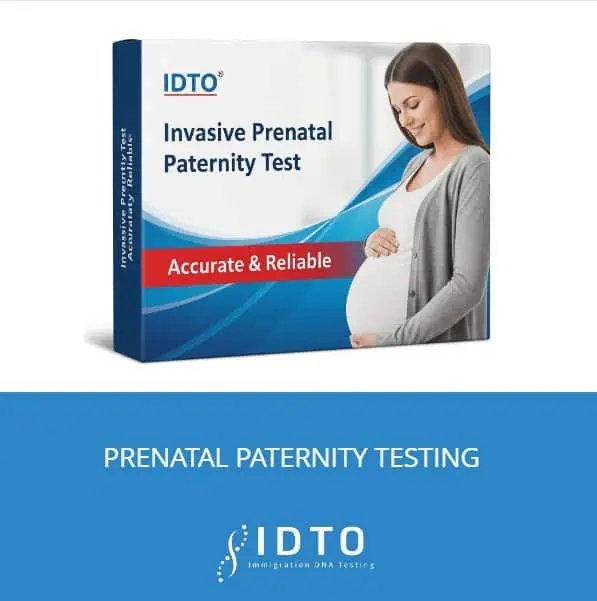PRENATAL PATERNITY TESTING – IDTO DNA

According to the Centers for Disease Control and Prevention (CDC), in the U.S., over 40% of births, or approximately 1 million annually, occur to single or unmarried mothers. Pregnant mothers who are uncertain about paternity or who need to prove paternity to an alleged father or husband have several options. Paternity testing options before and after birth are discussed below to help you make the best informed decision.
What is paternity DNA testing during pregnancy?
Prenatal paternity testing is a genetic test that determines the biological relationship between an alleged father and an unborn fetus. This can be done through invasive prenatal DNA testing, which requires amniocentesis or chorionic villus sampling (CVS). Or, non-invasive prenatal paternity testing requires only a blood draw from the mother
Can you do a paternity test while pregnant?
Yes, performing a DNA test during pregnancy is possible. Depending on the method, the requirements to get started will vary.
Common reason prenatal testing are performed?
Below are the common reasons prenatal DNA testing is performed.
- Uncertainty for unmarried men who want to prove paternity before signing an acknowledgement of paternity (AOP) form at the hospital.
- To establish paternity for child support.
- For peace of mind/personal knowledge.
It should be noted that this type of relationship DNA test determines biological relationships and does not provide information about health risks or genetic defects
What are the requirements for a paternity test before birth?
First, both parents must agree to participate in the prenatal paternity testing process.
Next, all DNA samples will be tested and analyzed by our partner The Association for the Advancement of Blood and Biotherapies (AABB) accredited laboratory. The accreditation ensures DNA sample analysis will adhere to the highest industry standards.
All DNA samples must be collected by an unbiased third-party DNA sample collector to ensure all sample collection methods adhere to testing guidelines.
Important consideration: New York State residents are required to acquire one of the following documents before an appointment can be scheduled.
1. Prescription referral from a New York State licensed doctor.
2. A court order from a judge.
3. A letter requesting DNA testing be performed from a NYS licensed attorney.
The above-mentioned requirements are in accordance with the New York State Department of Health (NYSDOH) Guidelines.
Prenatal Paternity Testing Options
Invasive Prenatal Paternity Test: This testing option requires the involvement of an OB-GYN. Samples for CVS can be collected during weeks 10-13, or through an amniocentesis during weeks 15-20 of the mother’s pregnancy.
Please note, the mother’s OBGYN will not perform any of the procedures mentioned to perform paternity test as a stand alone procedure. An invasive prenatal paternity DNA test can only be performed if the mother’s doctor foresees an possible issue that will require a CVS or Amniocentesis be performed.
Each procedure has risks involved like a possible miscarriage. It is important that you speak with your healthcare provider about your options.
DNA samples collected by the OB-GYN will be sent directly to the lab and will be compared to the alleged father’s DNA profile. Call 888-204-0583 to learn more about this service
Non-Invasive Prenatal Paternity Test (NIPP): This is a testing option that can be performed as early as 7 weeks into the pregnancy. A blood draw is required from the mother to acquire fetal DNA cells that are compared to the cheek swab collection from the alleged father to determine paternity.
Please note, NIPP testing does not require an OB-GYN. Currently, IDTO DNA does not provide NIPP testing services. We focus solely on court-admissible invasive prenatal paternity testing, working in conjunction with your medical provider.
Alternative Paternity DNA Testing Options:
Below are standard cost-effective paternity testing options that can be performed after the birth of a child
At-Home Paternity Test Kit: This testing option a peace of mind DNA test that determines the biological relationship between an alleged father and child. Results from this testing option cannot be used legally.
Legal Paternity Test: This testing option is a legally admissible testing option that determines if an alleged father and child are biologically related.
Where can I get a prenatal DNA test?
Contact our office at 888-204-0583 to schedule an appointment for an alleged father and and provide us with the contact information for the mother’s OB-GYN. Below are the areas we service.
- Alabama
- Arizona
- Arkansas
- California
- Colorado
- Connecticut
- Delaware
- Florida
- Georgia
- Hawaii
- Idaho
- Illinois
- Indiana
- Iowa
- Kansas
- Kentucky
- Louisiana
- Maine
- Maryland
- Massachusetts
- Michigan
- Minnesota
- Mississippi
- Missouri
- Montana
- Nebraska
- Nevada
- New Hampshire
- New Jersey
- New Mexico
- New York
- North Carolina
- North Dakota
- Ohio
- Oklahoma
- Oregon
- Pennsylvania
- Rhode Island
- South Carolina
- Tennessee
- Texas
- Utah
- Vermont
- Virginia
- Washington
- West Virginia
- Wisconsin
How much does prenatal DNA paternity testing cost?
Pricing for invasive prenatal paternity testing starts at $900.00 which includes DNA testing shipping fees. DNA sample collection fees are not included in the cost of your DNA test. Collection fees vary depending your geographic location.
How long does an invasive prenatal paternity test take?
The turnaround time for results is 2 to 5 business days from the date all DNA samples arrive at the laboratory.
Frequently Asked Questions
How accurate is a invasive prenatal DNA test?
Invasive prenatal paternity testing process has an accuracy rate of 98% and higher.
Can a prenatal paternity test be used for legally?
Invasive Prenatal DNA tests can be used for legal purposes. A chain of custody will be established, samples will be collected by third-party collector and OB-GYN. DNA samples will be tested and analyzed by our partner AABB accredited laboratory in accordance with the AABB testing guidelines.
Does insurance cover invasive prenatal paternity testing?
No. Invasive prenatal DNA paternity testing is not covered by insurance. The process of performing a CVS or Amniocentesis may be covered by health insurance. We recommend you consult your service provider.
Are my DNA test results private and confidential?
Yes. DNA results are confidential. Results will only be released to the participants directly involved with your DNA testing process.
Please note IDTO and its partner laboratory do not share your DNA information with third-party companies. Furthermore, DNA samples are destroyed within 30 to 60 days after your DNA test is completed.
Why Choose Us IDTO DNA
IDTO DNA has helped thousands of customers nationwide with their relationship testing needs. Since 2004, we have been a trusted source for both legal and medical professionals seeking reliable DNA testing for their clients.
Our knowledgeable staff will guide you in selecting the right type of DNA test for your specific situation. This careful attention helps prevent ordering the wrong relationship test and avoids the need to pay for additional testing.
